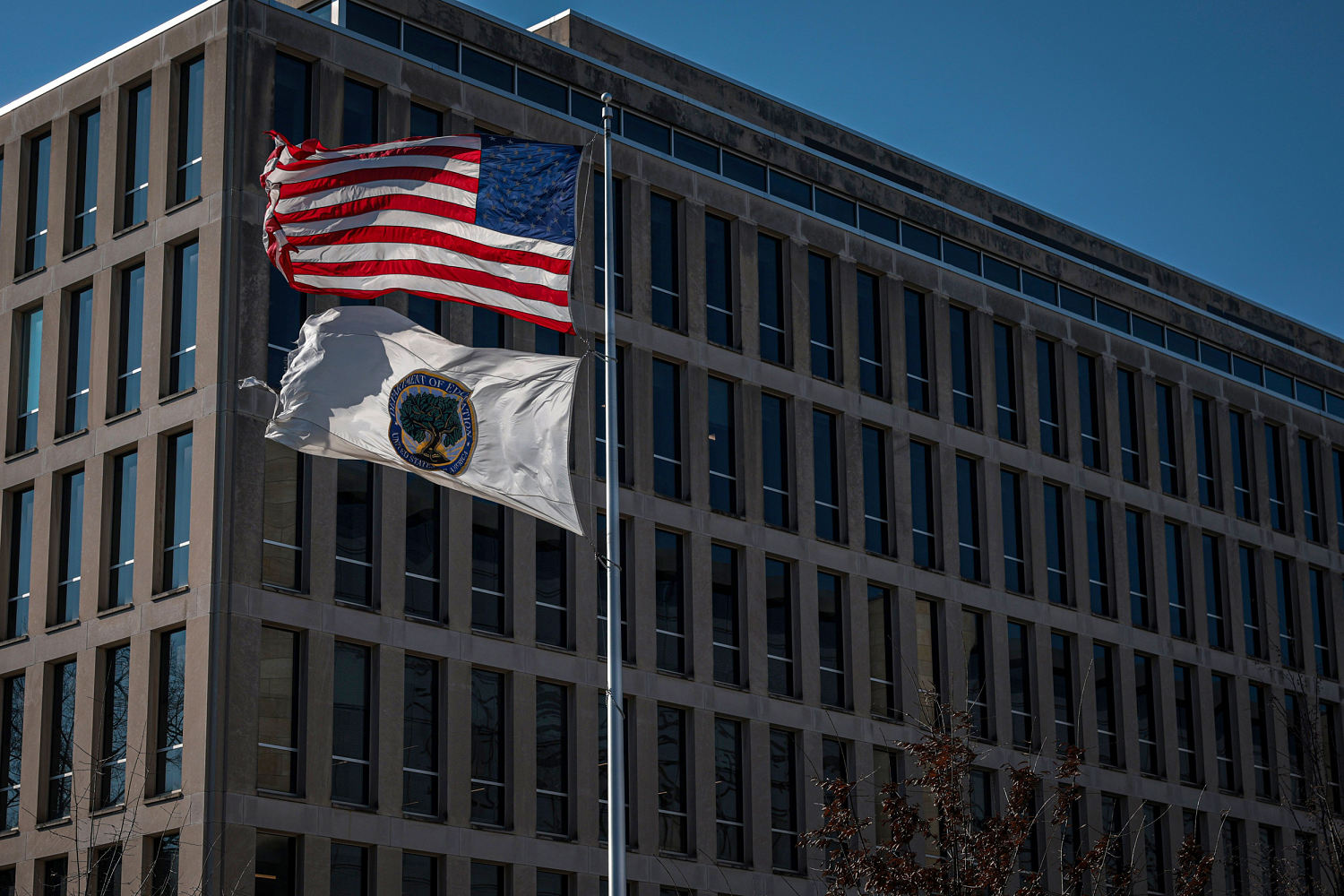How to save the future of federal data

The Trump administration has stunned everyone who relies on federal data — a huge group that includes policymakers, researchers, business leaders, journalists, physicians and government officials themselves.
Following the president’s directives on diversity, equity and inclusion, climate change and "gender ideology," federal agencies made thousands of web pages on dozens of websites disappear overnight, deleting large numbers of datasets in the process.
Some websites are starting to reappear, scrubbed of the banned terms and text. But we don’t know how the actual datasets on these and other government sites may be hidden, altered or deleted.
These concerns have activated the open data community, the informal network of techies, policy wonks and advocates who promote the use of open public data for public good. My nonprofit is tracking dozens of organizations that are working to download and archive essential datasets.
For example, the Harvard Law School Library Innovation Lab has copied more than 300,000 federal datasets, and the Internet Archive’s 20-year-old Wayback Machine has proven its value in saving federal data and websites. There’s a good chance we will still be able to access most if not all public federal data that was available before Inauguration Day, including data on social issues from climate and environmental justice to health care and housing.
But today’s data will not help us solve tomorrow’s problems — and that’s where the biggest challenge lies. Trump’s executive orders on diversity, climate, gender and perhaps more to come could lead to major changes in how future data is collected and published. In addition, the administration could discontinue or fail to update important tools and maps that present data to the public.
Here are some ways to preserve the country’s essential data and put it to good use.
- Make the business case for detailed, accurate data. Accurate federal data, including demographic data on gender, race and ethnicity, is essential to any business that needs to understand American markets. Business leaders can advocate keeping major data collections like the Census Bureau’s American Community Survey intact.
- Maintain legally required data from agencies at risk. The Trump administration is moving to shutter federal agencies that, among other duties, are required by law to collect important datasets. The Consumer Financial Protection Bureau collects data to ensure fair mortgages and fair lending, for example, and the Department of Education collects data on educational attainment nationwide. Whatever happens to these and other agencies, their mandated data collections need to continue. Some organizations may litigate to keep data available, as a physician’s organization did successfully and as an environmental organization representing farmers is doing for climate data.
- Advocate for data budgets. Aside from political issues, some essential data sources, like the Bureau of Labor Statistics, are chronically underfunded and vulnerable to future budget cuts. Organizations that use their data can advocate for adequate funding to maintain and build these essential resources.
- Monitor changes in data collection. Federal agencies may change or remove variables related to race, ethnicity, gender identity and sexual orientation when they collect data in the future. Interested organizations can use tools like the Data Foundation’s SAFE-Track platform to monitor these changes, flag them publicly and advocate to reverse them.
- Recreate essential tools and maps. Analytical tools and maps are essential to give meaning to federal data. Anticipating the Trump administration, the Environmental Data and Governance Initiative began working months ago to replicate the widely used Climate and Environmental Justice Screening Tool. When the Trump administration took these down, their partners had the data and code to replicate and repost them within days. Other organizations can identify tools and maps that are likely to disappear, if they haven’t already, and recreate and update them.
- Engage at the state and local level. Academics and other researchers can analyze state government data when federal data is lacking, as Johns Hopkins University did during the COVID pandemic. At the same time, they can help state governments resist political pressure to change their own data collections.
- Enforce the Foundations for Evidence-Based Policymaking Act (the Evidence Act). In 2019, President Trump signed the bipartisan Evidence Act, which requires federal agencies to make their data more open and useful. Recent guidance from the Office of Management and Budget directs agencies to implement the act by engaging with the public and prioritizing data that can have the greatest public benefit. That should include ensuring that federal data is accurate, complete, and detailed enough to support social goals.
The Evidence Act established that the federal data system, with its hundreds of thousands of datasets, is a critical part of our national infrastructure. The many groups and organizations that rely on federal data can hold the White House and Congress accountable to that basic principle and ensure that we maintain the country’s essential data resources.
Joel Gurin is president of the nonprofit Center for Open Data Enterprise, based in Washington, which he founded in 2015.
Topics
-

How much federal data has Trump really purged?
Since Trump took office, almost 3,400 datasets from Data.gov have been removed.The Hill - 5d -

How Trump’s mission to Mars could save the nation
A robotic colony on Mars might seem like far-fetched science fiction, but so was the Moonshot. American Exceptionalism will rise again.The Hill - 5d -

DOGE says it's now saved $65B in federal funds, but that's still impossible to verify
DOGE has updated its website to say it's slashed $65 billion in federal funding -- but they only provide records for $9.6 billion in savings from contract terminations.ABC News - 9h -

Fired federal workers see their dreams shattered and an uncertain future
As the Trump administration hacks away at government agencies, many employees who were cut are left fearing for their future and in the dark about their next steps.ABC News - Feb. 20 -
Federal judge blocks Musk's DOGE from access to student loan borrowers' personal data
Elon Musk's government-slashing effort, DOGE, is temporarily barred from accessing personal data on 42 million student loan borrowers, a federal judge ruled.CNBC - 3d -

Judge blocks Department of Education, federal personnel office from sharing data with DOGE
A federal judge in Maryland has blocked the Department of Education and Office of Personnel Management from sharing the personal information of plaintiffs in a lawsuit against the Trump ...NBC News - 3d -
Federal jobs went from reliable to risky overnight. Here’s where Americans can find stable work now — and in the future.
No job is disruption-proof, but these industries are projected to grow over the next decade.MarketWatch - 5h -

We asked the people of Gaza how they saw their future – this is what we found | Nils Mallock
Support for Hamas is declining – no obvious alternative has emerged, but our poll shows there are reasons to be hopeful. Nils Mallock is research fellow at the XCEPT research group at King’s ...The Guardian - 6d -

How Federal Employees Are Fighting Back Against Elon Musk
Some civil servants are using whatever levers they have to resist the orders of the world’s richest man, both in public and behind closed doors.The New York Times - 5d
More from The Hill
-

Democratic senator presses Trump CFPB nominee: 'Who's really going to be in charge?'
Sen. Tina Smith (D-Minn.) pressed President Trump’s nominee to lead the Consumer Financial Protection Bureau (CFPB) over who will be making key decisions at the agency Thursday, after it dismissed ...The Hill - 41m -

Trump cuts off talk of Canada annex alongside UK’s Starmer: ‘That’s enough’
President Trump on Thursday cut off talk during a press conference with UK’s Prime Minister Keir Starmer about his desire to make Canada “the 51st state,” with Starmer insisting there is no ...The Hill - 43m -

Trump lays out Ukraine minerals deal ahead of Zelensky meeting
President Trump on Thursday offered more details about the mineral agreement the U.S. is set to sign with Ukraine, arguing it would allow America to recoup aid provided to Kyiv, while boosting ...The Hill - 48m -

Florida AG orders inquiry into Tate brothers as they land in Miami
Florida Attorney General James Uthmeier on Thursday ordered a probe into Andrew and Tristan Tate, influencer brothers, as they landed in the U.S. from Romania, where they have been charged with ...The Hill - 53m -

Live updates: Trump holds press conference with British PM Starmer
British Prime Minister Keir Starmer and President Trump are holding a joint press conference at the White House on Thursday as European allies scramble to respond to the president’s approach to ...The Hill - 55m
More in Politics
-

Democratic senator presses Trump CFPB nominee: 'Who's really going to be in charge?'
Sen. Tina Smith (D-Minn.) pressed President Trump’s nominee to lead the Consumer Financial Protection Bureau (CFPB) over who will be making key decisions at the agency Thursday, after it dismissed ...The Hill - 41m -

Trump cuts off talk of Canada annex alongside UK’s Starmer: ‘That’s enough’
President Trump on Thursday cut off talk during a press conference with UK’s Prime Minister Keir Starmer about his desire to make Canada “the 51st state,” with Starmer insisting there is no ...The Hill - 43m -

‘The closest of nations’: UK Prime Minister pledges cooperation with Trump after meeting
NBC News White House Correspondent Yamiche Alcindor, Sky News Anchor Sir Trevor Phillips and Council on Foreign Relations Fellow Elise Labott join Meet the Press NOW to report on President Trump’s ...NBC News - 45m -

Trump lays out Ukraine minerals deal ahead of Zelensky meeting
President Trump on Thursday offered more details about the mineral agreement the U.S. is set to sign with Ukraine, arguing it would allow America to recoup aid provided to Kyiv, while boosting ...The Hill - 48m -

Florida AG orders inquiry into Tate brothers as they land in Miami
Florida Attorney General James Uthmeier on Thursday ordered a probe into Andrew and Tristan Tate, influencer brothers, as they landed in the U.S. from Romania, where they have been charged with ...The Hill - 53m